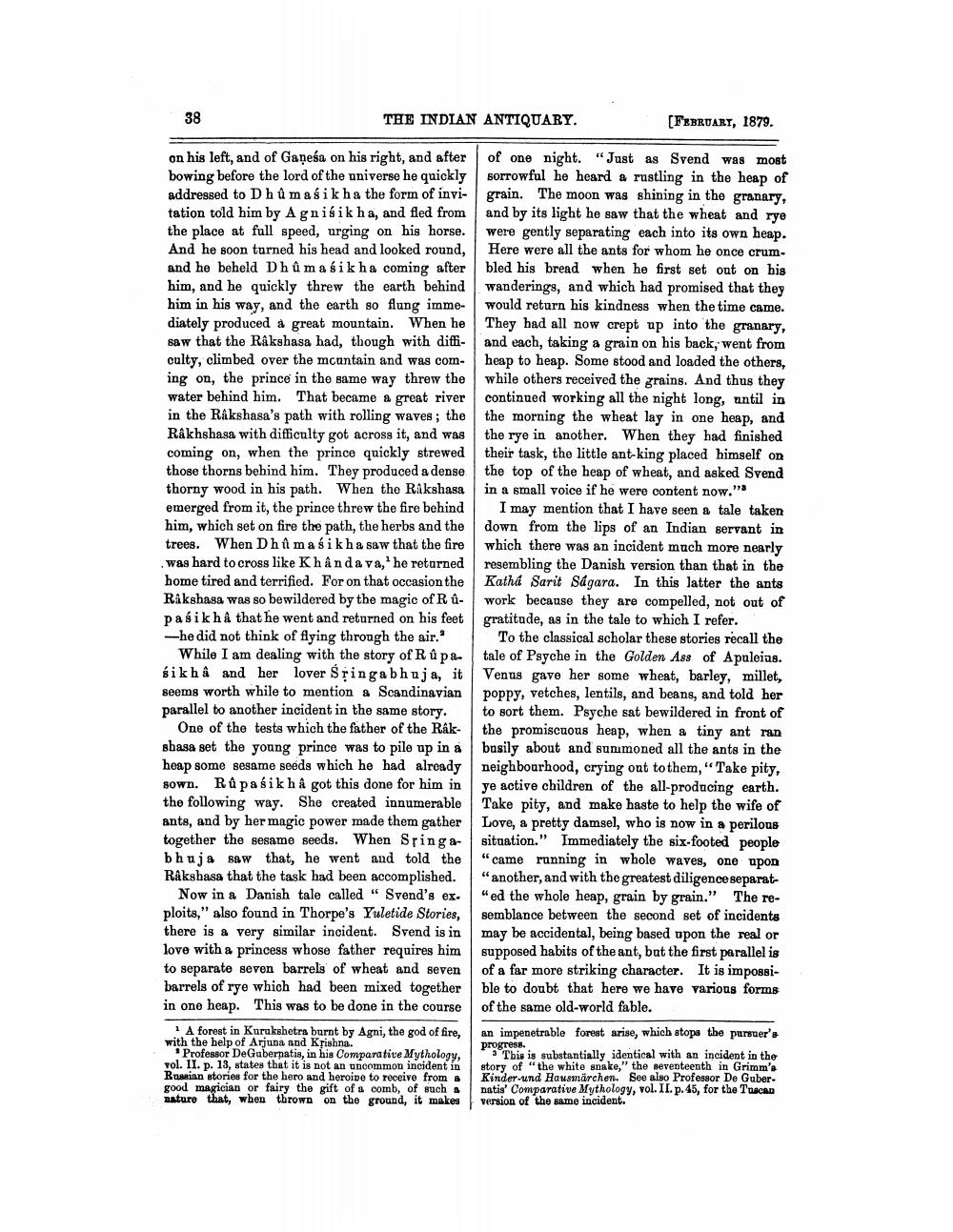________________
38
THE INDIAN ANTIQUARY.
on his left, and of Gaṇeśa on his right, and after bowing before the lord of the universe he quickly addressed to D h û masikha the form of invitation told him by Agnisik ha, and fled from the place at full speed, urging on his horse. And he soon turned his head and looked round, and he beheld Dhûmasikha coming after him, and he quickly threw the earth behind him in his way, and the earth so flung immediately produced a great mountain. When he saw that the Rakshasa had, though with difficulty, climbed over the mcuntain and was coming on, the prince in the same way threw the water behind him. That became a great river in the Rakshasa's path with rolling waves; the Rakhshasa with difficulty got across it, and was coming on, when the prince quickly strewed those thorns behind him. They produced a dense thorny wood in his path. When the Rakshasa emerged from it, the prince threw the fire behind him, which set on fire the path, the herbs and the trees. When Dhimasikha saw that the fire was hard to cross like Khândava,' he returned home tired and terrified. For on that occasion the Rakshasa was so bewildered by the magic of R ûpasikha that he went and returned on his feet -he did not think of flying through the air."
While I am dealing with the story of R û pasikha and her lover Sringa bhuja, it seems worth while to mention a Scandinavian parallel to another incident in the same story.
One of the tests which the father of the Râkshasa set the young prince was to pile up in a heap some sesame seeds which he had already sown. Rupasikh â got this done for him in the following way. She created innumerable ants, and by her magic power made them gather together the sesame seeds. When Sring a bhuja saw that, he went and told the Rakshasa that the task had been accomplished.
Now in a Danish tale called "Svend's exploits," also found in Thorpe's Yuletide Stories, there is a very similar incident. Svend is in love with a princess whose father requires him to separate seven barrels of wheat and seven barrels of rye which had been mixed together in one heap. This was to be done in the course
A forest in Kurukshetra burnt by Agni, the god of fire, with the help of Arjuna and Krishna.
Professor DeGubernatis, in his Comparative Mythology, vol. II. p. 13, states that it is not an uncommon incident in Russian stories for the hero and heroine to receive from a good magician or fairy the gift of a comb, of such a nature that, when thrown on the ground, it makes
[FEBRUARY, 1879.
of one night. "Just as Svend was most sorrowful he heard a rustling in the heap of grain. The moon was shining in the granary, and by its light he saw that the wheat and rye were gently separating each into its own heap. Here were all the ants for whom he once crumbled his bread when he first set out on his wanderings, and which had promised that they would return his kindness when the time came. They had all now crept up into the granary, and each, taking a grain on his back, went from heap to heap. Some stood and loaded the others, while others received the grains. And thus they continued working all the night long, until in the morning the wheat lay in one heap, and the rye in another. When they had finished their task, the little ant-king placed himself on the top of the heap of wheat, and asked Svend in a small voice if he were content now.""
I may mention that I have seen a tale taken down from the lips of an Indian servant in which there was an incident much more nearly resembling the Danish version than that in the Katha Sarit Sagara. In this latter the ants work because they are compelled, not out of gratitude, as in the tale to which I refer.
To the classical scholar these stories recall the tale of Psyche in the Golden Ass of Apuleius. Venus gave her some wheat, barley, millet, poppy, vetches, lentils, and beans, and told her to sort them. Psyche sat bewildered in front of the promiscuous heap, when a tiny ant ran busily about and summoned all the ants in the neighbourhood, crying out to them, "Take pity, ye active children of the all-producing earth. Take pity, and make haste to help the wife of Love, a pretty damsel, who is now in a perilous situation." Immediately the six-footed people 'came running in whole waves, one upon "another, and with the greatest diligence separat"ed the whole heap, grain by grain." The resemblance between the second set of incidents may be accidental, being based upon the real or supposed habits of the ant, but the first parallel is of a far more striking character. It is impossible to doubt that here we have various forms of the same old-world fable.
66
an impenetrable forest arise, which stops the pursuer's progress.
3 This is substantially identical with an incident in the story of "the white snake," the seventeenth in Grimm's Kinder-und Hausmärchen. See also Professor De Gubernatis' Comparative Mythology, vol. II. p. 45, for the Tuscan version of the same incident."




